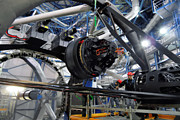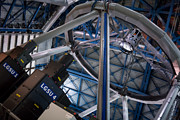Announcement
ESO’s VLT Adaptive Optics Facility receives the 2018 Paul F. Forman Team Engineering Excellence Award
18 September 2018
The pioneering work of ESO’s Adaptive Optics Facility (AOF) team has been recognised by the Optical Society (OSA). The AOF team have been awarded the 2018 Paul F. Forman Team Engineering Excellence Award. They received the OSA prize during the Frontiers in Optics (FiO) + Laser Science (LS) Awards Ceremony held on 17 September, in Washington DC, USA.
The team was awarded the prize for equipping Yepun, the 8.2-metre Unit Telescope 4 of ESO’s Very Large Telescope, with Adaptive Optics. The AOF was a major project to improve the vision of the Multi Unit Spectroscopic Explorer (MUSE) and the High Acuity Wide-field K-band Imager (HAWK-I) instruments by providing them with the ability to compensate for the blurring effect of the Earth’s atmosphere [1].
The precise and complex engineering behind the AOF has now been recognised with the Paul F. Forman Team Engineering Excellence Award, which was received by Elise Vernet, Johann Kolb and Robin Arsenault on behalf of the AOF team. The award is presented yearly to celebrate the highest technical achievements or contributions to society in the field of optical engineering and has previously been awarded to engineering teams working on groundbreaking projects like the Advanced LIGO experiment, which was famously used to detect gravitational waves from colliding black holes and neutron stars.
The engineering behind ESO’s telescopes has previously been recognised by this prestigious award. In 2017, the Guide Star Alliance received the award for the production of high-power guide star lasers (SodiumStar). The SodiumStar was the outcome of an industrial partnership between ESO’s AOF team, TOPTICA Photonics, and MPB Communications (MPBC), and has been recognised as a core technology for the next generation of ground-based telescopes [2].
Through this prime example of pioneering engineering, the AOF team has equipped astronomers in ESO’s Member States with an invaluable tool to explore the universe. Furthermore, the experience gained by ESO engineers will prove vital in overcoming future engineering challenges, such as building the Extremely Large Telescope — the world’s biggest eye on the sky.
Notes
[1] The AOF is composed of many parts working together, including the Four Laser Guide Star Facility and the very thin deformable secondary mirror of UT4. The 4LGSF shines four 22-watt laser beams into the sky to make sodium atoms in the upper atmosphere glow, producing points of light on the sky that mimic stars. Sensors in the adaptive optics modules GRAAL and GALACSI use these artificial guide stars to determine atmospheric conditions and the corrections required to improve image quality. One thousand times per second, the AOF system adapts to atmospheric conditions by changing the shape of the telescope’s Deformable Secondary Mirror to compensate for atmospheric disturbances. This requires coordination between many different subsystems and is what allows the AOF to provide MUSE and HAWK-I with such exquisitely sensitive vision.
[2] Other industrial partnerships have also been instrumental to the success of the AOF. Microgate and ADS delivered the Deformable Secondary Mirror, an integral part of which is the 1.1 m thin shell mirror produced by SAGEM-REOSC. NTE Sener delivered the GRAAL opto-mechanical system and TNO produced launch telescopes for the Four Laser Guide Star Facility. NOVA made major contributions to the ASSIST bench used to qualify the AOF in Europe, and the MUSE consortium, as well as providing a state-of-the-art instrument, helped qualify the performance of the AOF.
Links
- Adaptive Optics Facility
- Cutting-edge Adaptive Optics Facility Sees First Light
- Members of the AOF Team
Contacts
Robin Arsenault
AOF Project Manager
Garching bei München, Germany
Tel: +49 89 3200 6524
Email: rarsenau@eso.org
Calum Turner
ESO Public Information Officer
Garching bei München, Germany
Tel: +49 89 3200 6670
Email: pio@eso.org
About the Announcement
| Id: | ann18066 |
Our use of Cookies
We use cookies that are essential for accessing our websites and using our services. We also use cookies to analyse, measure and improve our websites’ performance, to enable content sharing via social media and to display media content hosted on third-party platforms.
ESO Cookies Policy
The European Organisation for Astronomical Research in the Southern Hemisphere (ESO) is the pre-eminent intergovernmental science and technology organisation in astronomy. It carries out an ambitious programme focused on the design, construction and operation of powerful ground-based observing facilities for astronomy.
This Cookies Policy is intended to provide clarity by outlining the cookies used on the ESO public websites, their functions, the options you have for controlling them, and the ways you can contact us for additional details.
What are cookies?
Cookies are small pieces of data stored on your device by websites you visit. They serve various purposes, such as remembering login credentials and preferences and enhance your browsing experience.
Categories of cookies we use
Essential cookies (always active): These cookies are strictly necessary for the proper functioning of our website. Without these cookies, the website cannot operate correctly, and certain services, such as logging in or accessing secure areas, may not be available; because they are essential for the website’s operation, they cannot be disabled.
Functional Cookies: These cookies enhance your browsing experience by enabling additional features and personalization, such as remembering your preferences and settings. While not strictly necessary for the website to function, they improve usability and convenience; these cookies are only placed if you provide your consent.
Analytics cookies: These cookies collect information about how visitors interact with our website, such as which pages are visited most often and how users navigate the site. This data helps us improve website performance, optimize content, and enhance the user experience; these cookies are only placed if you provide your consent. We use the following analytics cookies.
Matomo Cookies:
This website uses Matomo (formerly Piwik), an open source software which enables the statistical analysis of website visits. Matomo uses cookies (text files) which are saved on your computer and which allow us to analyze how you use our website. The website user information generated by the cookies will only be saved on the servers of our IT Department. We use this information to analyze www.eso.org visits and to prepare reports on website activities. These data will not be disclosed to third parties.
On behalf of ESO, Matomo will use this information for the purpose of evaluating your use of the website, compiling reports on website activity and providing other services relating to website activity and internet usage.
Matomo cookies settings:
Additional Third-party cookies on ESO websites: some of our pages display content from external providers, e.g. YouTube.
Such third-party services are outside of ESO control and may, at any time, change their terms of service, use of cookies, etc.
YouTube: Some videos on the ESO website are embedded from ESO’s official YouTube channel. We have enabled YouTube’s privacy-enhanced mode, meaning that no cookies are set unless the user actively clicks on the video to play it. Additionally, in this mode, YouTube does not store any personally identifiable cookie data for embedded video playbacks. For more details, please refer to YouTube’s embedding videos information page.
Cookies can also be classified based on the following elements.
Regarding the domain, there are:
- First-party cookies, set by the website you are currently visiting. They are stored by the same domain that you are browsing and are used to enhance your experience on that site;
- Third-party cookies, set by a domain other than the one you are currently visiting.
As for their duration, cookies can be:
- Browser-session cookies, which are deleted when the user closes the browser;
- Stored cookies, which stay on the user's device for a predetermined period of time.
How to manage cookies
Cookie settings: You can modify your cookie choices for the ESO webpages at any time by clicking on the link Cookie settings at the bottom of any page.
In your browser: If you wish to delete cookies or instruct your browser to delete or block cookies by default, please visit the help pages of your browser:
Please be aware that if you delete or decline cookies, certain functionalities of our website may be not be available and your browsing experience may be affected.
You can set most browsers to prevent any cookies being placed on your device, but you may then have to manually adjust some preferences every time you visit a site/page. And some services and functionalities may not work properly at all (e.g. profile logging-in, shop check out).
Updates to the ESO Cookies Policy
The ESO Cookies Policy may be subject to future updates, which will be made available on this page.
Additional information
For any queries related to cookies, please contact: pdprATesoDOTorg.
As ESO public webpages are managed by our Department of Communication, your questions will be dealt with the support of the said Department.



